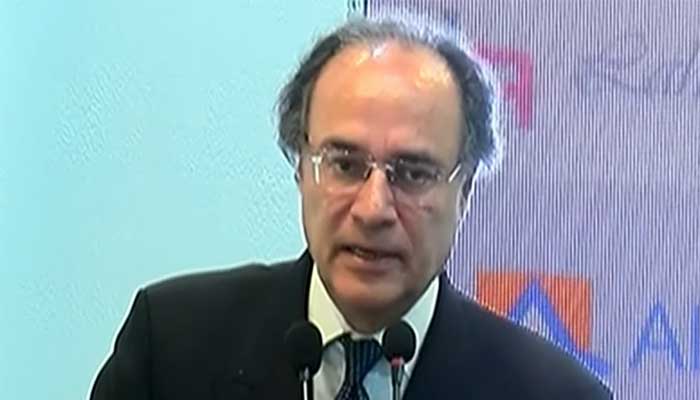ISLAMABAD: Finance Minister Muhammad Aurangzeb on Saturday emphasized the need for a strong economic framework, stating that sustainable governance cannot rely solely on charity. His remarks addressed concerns over Pakistan’s reliance on the International Monetary Fund (IMF).
Speaking at the 3rd All Pakistan Chambers Presidents Conference at the Faisalabad Chamber of Commerce & Industry (FCCI), the finance minister stated, “The main reason for our economic challenges is the lack of structural reforms needed to change the DNA of the economy.”
He pointed out that the current tax-to-GDP ratio of 9-10% is unsustainable, highlighting that “in a country of 240-250 million people, if only a small percentage pay taxes, progress cannot be achieved.”
Aurangzeb further emphasized that while hospitals and education systems may run on charity, governments cannot. To ensure economic sustainability, the government aims to increase the tax-to-GDP ratio to 13.5%.
He noted that the government’s efforts to expand the tax base have eased the burden on the national treasury and contributed to economic improvement.
Economic Stability Measures
Aurangzeb reaffirmed that Pakistan’s economy is showing signs of improvement. He added that lower policy rates have benefited business owners and that ongoing stability measures are yielding positive results. He also claimed that inflation has dropped to single digits, providing relief to the public.
The finance minister highlighted that recent tax reforms had significantly increased revenue collection.
Aurangzeb stressed the importance of public-private sector collaboration for economic growth, stating that such partnerships are crucial for long-term progress.
IMF Missions and Future Financial Plans
The IMF has confirmed that two of its missions will visit Pakistan within the next two weeks. The first mission will focus on climate finance discussions, while the second will review Pakistan’s progress under the $7 billion Extended Fund Facility (EFF).
The finance minister revealed that Pakistan expects to receive $1 to $1.5 billion in climate funding from the IMF.
A second IMF mission is set to visit Pakistan in March for a six-monthly review of the country’s economic performance under the EFF.
He also stated that Pakistan’s current account posted a $420 million deficit in January 2025, a 4% increase from $404 million in the same month last year. However, in the first seven months of FY25, Pakistan posted a surplus of $682 million, a significant turnaround from a $1.801 billion deficit in the same period last year.



